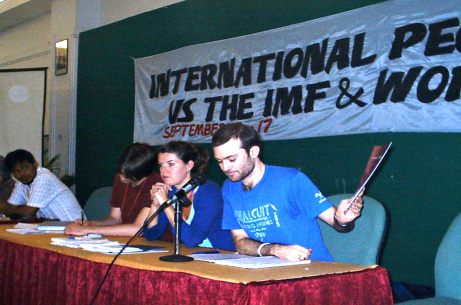
Luke Fletcher speaks about his work for Jubilee Australia and his research into the underpinnings of the current global economic system.
Most development specialists focus on the 1970s and onwards when they talk about the origins of the current global situation, but Luke Fletcher [2010] believes it is vital to look at the decades before that to truly understand the origins of the current system.
He is doing his PhD in Politics and International Studies on the origins and history of globalisation and international development.
He did not originally intend to end up focusing on economic issues. Luke was expecting to work in human rights after finishing his undergraduate degree in history and philosophy at the University of Sydney.
He had been studying issues such as genocide and violence in Rwanda and was keen to get involved in civil society activism work, but the first job he got on graduating was in development at the NGO Jubilee Australia.
“It was not what I was expecting,” he says. However, he is still involved in the organisation seven years later and it has shaped his subsequent studies at Cambridge.
“I got more and more interested in development issues and economic justice,” he says. While working for the NGO he also completed a Masters at the University of California, Berkeley, on a Rotary Foundation Scholarship. “I felt if I wanted to do the work properly I needed to understand the issues more,” he says. “I needed the background in development and economics and the Masters gave me more confidence.”
As part of the scholarship, he did a summer internship with the Global Witness project. His masters focused on development and conflict, particularly in extractive industries like mining, and how resource rich countries are exploited for their resources. This dovetailed well with Global Witness’ work.
Robin Hood tax
Just as Luke was leaving Berkeley in late 2009, the Australian government started funding a big gas project in Papua New Guinea and a gold-mining project in the Solomon Islands. Jubilee Australia initiated a campaign to bring a Robin Hood tax – a tax on big financial transactions – to Australia. “It was a very exciting time,” says Luke.
“Our campaign has led to good reforms on export credit agencies and good media coverage. A quarter of Australia’s export credit finance goes towards supporting the extractive industries, mainly in the Asia Pacific region. The government does tend to support big business projects and the due diligence is sometimes lacking. Institutions can focus on the bottom line and don’t put a lot of resources into social environmental issues.”
He is still on the board of Jubilee Australia and is director of research which he does from Cambridge through conference calls and teleworking, but is not as involved as in the past due to the demands of his PhD.
He says his PhD is in many ways a continuation of his work at Berkeley since it looks back at the origins of the current financial system which has led to the current crisis and how the system allows bad decisions to be taken to save it. “My interest is in how the global finance system and institutions like the IMF was built and how it evolved,” he says.
He believes the late forties until the early sixties is a critical era as it was when Europe and the US consolidated their power, the new institution of development loans were initiated and when the “Third World” became integrated into the financial system. This was in contrast to the Marshall Plan which relied mainly on grants which had no repayment element,.
However, he says development experts tend to mainly start from the 1970s onwards when a new development era, dominated more by market principles, became predominant. “Analysts often leave out how the system evolved to that point and what the seeds were for that, on the connection between development and the financial flow from north to south. I’m interested in tracking how the system operated whereas a lot of people are looking at why development policies fail. I want to find out why globalisation happened the way it did. It was not a fait accompli. Conscious decisions were taken.”
Luke, who is President of St Edmund’s College Common Room at the University of Cambridge, hopes to complete his PhD in 18 months and continue both his activism on policy issues and his academic work.












